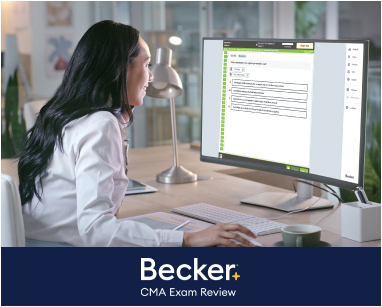Becoming a Certified Management Accountant can open the door to a wide range of job opportunities. In fact, this is probably why so many people choose to endure the studying and rigorous learning required to earn the CMA designation. one of the best benefits of enduring months of studying are the job opportunities after the CMA designation is earned. If you're wondering kind of opportunities may be available, we're exploring five CMA career paths to help you choose an option that matches your strengths and interests while practicing key skills.
CMA career path #1: Corporate controller
A controller plans and directs all of the accounting functions at a given organization and ensures that accurate financial statements are generated. More specifically, here are some of the main duties of corporate controllers:
- Provide management reports for decision-making purposes
- Work with the company’s external auditors
- Manage the annual budgeting process
- Assess internal controls, and make changes to improve controls
- Oversee tax compliance and regulatory issues
The financial statement, budgeting and internal control topics on the CMA Exam are particularly useful for controllers to be intimately familiar with. Working as a controller is a great way to learn everything about a particular industry, as you’ll be able to deep-dive into the financials of your company. Your financial management expertise may help make the corporate controller role a successful career after the CMA Exam.
CMA career path #2: Financial analyst
A financial analyst role is less about traditional accounting tasks and more about analysis and forecasting. You may work as an analyst for a corporation, a money manager, or in another role.
Financial analysts forecast revenue, expenses and other important outcomes for a business. They determine a company’s capital budgeting needs and the financial impact of starting a new product line or purchasing a business. They also determine the rate of return for particular business decisions.
The CMA Exam covers corporate finance, risk management and investment decisions, all of which are useful skills for a financial analyst.
CMA career path #3: Cost accountant
Effective cost accountants are difficult to find, and you can provide a great deal of value to a business in this role. These types of accountants determine cost standards for material, labor and overhead costs in order to create budgets. They analyze production costs and recommend changes to reduce costs and increase efficiency.
The budgeting, forecasting, and cost management topics on the CMA Exam are extremely useful tools for cost accountants, as you’ll have to know these concepts inside and out to work effectively as a cost accountant.
CMA career path #4: Risk manager
Risk management has become a key role in every business organization. As companies face a number of regulatory and financial risks, businesses need experts to monitor and reduce risks before they arise to prevent any kind of liability. Risk managers must be able to effectively communicate risk issues and solutions to the entire company. You can work as a risk manager in a variety of industries.
Here are some important duties of risk managers:
- Analyze the financial impact of business decisions
- Determine where company risks exist, and build appropriate risk management systems
- Evaluate the costs and legal requirements to adequately address risks
- Determine which types of insurance coverage should be in place to manage risks
Risk management professionals need to understand internal controls, risk management and decision analysis. Each of these topics is tested on the CMA Exam.
CMA career path #5: Chief Financial Officer (CFO)
As CFO, you are responsible for all of the financial and accounting issues for a business. CFOs have these main responsibilities in their daily workloads:
- Manage the controller and all accounting-related staff
- Ensure that all transactions are posted, and that accurate financial statements are generated
- Manage the process of identifying and correcting weaknesses in internal controls
- Analyze cash flow and capital expenditure plans to make informed business decisions
Being a CFO requires virtually all of the skills tested on the CMA Exam, with particular emphasis on forecasting, risk management and investment decisions.
Becker can help you on your CMA career path
There are a number of CMA jobs and professional options that become accessible once you earn your certification, and Becker can help you meet that goal. With our CMA Exam review course, you'll get in-depth textbooks, lecture videos to provide clarity, and simulated exams to test your knowledge. See how we get you Exam Day Readysmand get a 14-day free trial of our exam review!









